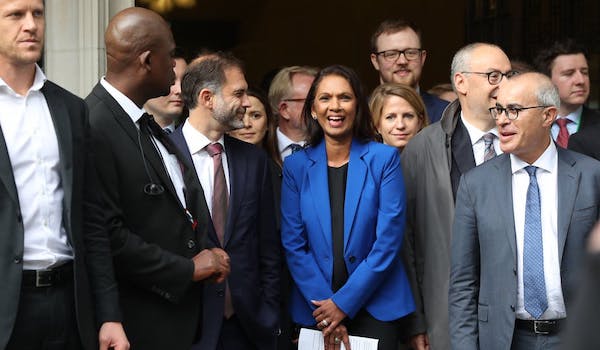International
Brexit: Boris Johnson defeated by UK Supreme Court – but he could still emerge as a winner

It’s fairly clear that the tectonic plates of the British constitution are shifting. After a grating and grinding battle between the legislature and the constitution, the main friction point moved to the judicial sphere.
And the UK Supreme Court has ruled that the process by which prime minister prorogued parliament for five weeks in the run-up the October 31 date when Brexit is now due was not lawful. What happens now in terms of process is unclear but what appears to have been almost completely overlooked in the generally turgid and jargon-rich commentaries that have surrounded the case is that the result is unlikely to matter.
In fact, despite losing this specific trial of strength, Johnson may still come out the winner.
The goal of the teams taking on the government in court was to stop executive overreach. They argued that the government had devised a lengthy prorogation to limit the time available for parliament to hold the government to account over Brexit ahead of the October 31 deadline. The government insisted that the break was needed to organise a new parliamentary session. The courts have decided this was not the case.
But judicial bravery in highly contested constitutional waters may have the unintended consequence of delivering a major “Boris boost” in terms of public support. Whether through serendipity or strategy (probably the former) the prime minister has created a win-win situation that nobody seems to have noticed.
The Supreme Court upheld campaigner Gina Miller’s appeal and overturned a ruling by the English High Court that suspending parliament was “not a matter” for the judiciary.
In so doing, the court is, in effect, siding with the highest court in Scotland, which ruled earlier this month that the prorogation of parliament was unlawful as “it had the purpose of stymieing parliament”.
This decision is certain to spark the political equivalent of a volcanic eruption with claims and counter-claims of judicial activism and political incompetence. Academics will undoubtedly scuttle off to the library in an attempt to somehow reconcile the Supreme Court’s decision with legal scholar J. A. G. Griffith’s classic account of “the political constitution” in the United Kingdom (Modern Law Review, 1979 and still well worth reading).
In reality, such matters are relatively simple. The court’s decision is constitutionally legitimate on the basis that it was upholding the basic tenet of parliamentary sovereignty. Far from undermining the political constitution, the Supreme Court would from this position be protecting it, while retaining a politically subservient position.
But what no one seems to have considered is that Johnson is an explicitly populist politician. He will live to whiff-whaff another day. His whole approach to gaining the keys to No.10 has revolved around constantly responding to – and to some extent amplifying – the populist signal, not least over Brexit. In this context, a Supreme Court defeat risks simply playing into Johnson’s gameplan. It will not stop Brexit. But for Johnson and, especially for his shady apparatchiks, it will be yet another example of “them” (that is, the elite, the experts, the untouchables that wield power without responsibility) against “us” (the Great British public).
The rules of political engagement have already been altered almost beyond recognition, and Johnson’s entire brand is based on being an unconventional politician.
The great risk of the Supreme Court ruling is that it will add fuel to a populist fire that is already raging about the need for a strong leader. Indeed,
one of the few similarities between all the different manifestations of populism that have emerged around the world over the past decade is the existence of a charismatic and strong leader who can mobilise the masses and manipulate how dominant issues are framed. In the UK it is Johnson who seems to be staking the greatest claim to this role – and his popularity amongst Conservative Party members provides a powerful platform.
Britain’s threadbare constitutional framework makes it particularly vulnerable to the wrath of a strong leader. Where other countries have adopted a codified constitution, clear rules of engagement and an explicit role for the courts in curbing executive power, the British constitution operates through what the eminent constitutional historian Peter Hennessy has called “the good chaps theory of government”, which presumes that all politicians will exercise a high degree of self-restraint, respecting the unwritten rules of the constitution.
What’s worrying is that the words “Boris Johnson” and “self restraint” have rarely – if ever – been used in the same sentence. He is not a man to play by the rules and the power of populism appears far too tempting. This is reflected in his refusal to rule out simply suspending parliament again. This tendency to pander to populism is exactly why a judicial loss risks boosting rather than wounding the prime minister.
Matthew Flinders, Founding Director of the Sir Bernard Crick Centre for the Public Understanding of Politics, University of Sheffield
This article is republished from The Conversation under a Creative Commons license. Read the original article.
Join the conversation
Support Ripples Nigeria, hold up solutions journalism
Balanced, fearless journalism driven by data comes at huge financial costs.
As a media platform, we hold leadership accountable and will not trade the right to press freedom and free speech for a piece of cake.
If you like what we do, and are ready to uphold solutions journalism, kindly donate to the Ripples Nigeria cause.
Your support would help to ensure that citizens and institutions continue to have free access to credible and reliable information for societal development.
























